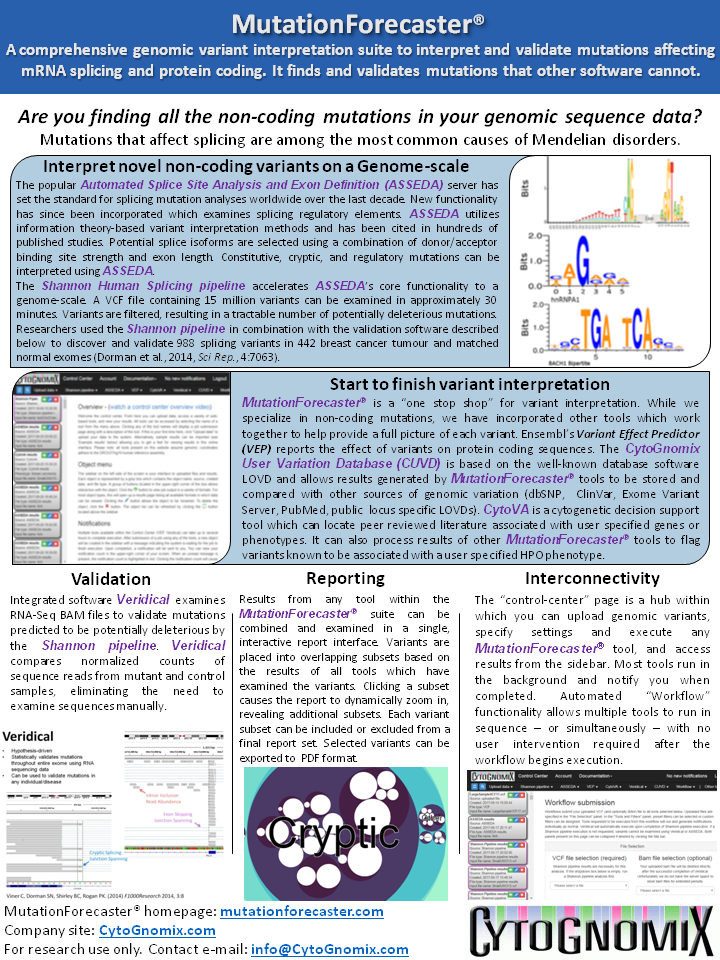overview
 CytoGnomix now offers a bespoke variant interpretation service which allows customers to simply supply a list of genomic variants and receive a prioritized list of variants with potentially deleterious non-coding effects.
CytoGnomix now offers a bespoke variant interpretation service which allows customers to simply supply a list of genomic variants and receive a prioritized list of variants with potentially deleterious non-coding effects.
Your variants will be examined by a team of experts using a unified, information theory-based method only available from CytoGnomix. We regularly publish novel variants discovered using our systems (ASSEDA, Shannon pipeline, Veridical) and peer-reviewed articles detailing recent advancements in our methods. In our experience, we will find variants with potential non-coding effects in any reasonably sized dataset. Non-coding variants we can identify include those that affect mRNA splicing (abolishing, leaky, cryptic site activation), transcription factor binding, RNA binding protein recognition, and splicing regulatory elements.
Recently published articles such as:
- Santana dos Santos et al. Assessment of functional impact of germline BRCA1/2 variants located in noncoding regions in families with breast-ovarian cancer predisposition.
- Yang et al. Prevalence and spectrum of germline rare variants in BRCA1/2 and PALB2 among breast cancer cases in Sarawak, Malaysia. (2017)
- Mucaki et al. A unified analytic framework for prioritization of non-coding variants of uncertain significance in heritable breast and ovarian cancer. (2016)
demonstrate novel non-coding variants can have significant functional effects and should not be overlooked. Bespoke analysis allows any laboratory to utilize our unified, information theory-based framework to explore the non-coding effects of their variants.
CytoGnomix offers personalized written and oral consulting about your data at no additional cost. Projects are priced according to the number of variants / exomes / genomes to be examined. See our pricing table below for more information.
a proven approach
Our tools for non-coding variant interpretation utilize an information theory-based approach to model binding sites and accurately estimate the affinity of these sites to bind with proteins and other macromolecular complexes. Since ASSEDA became available in 2005, it has been used to interpret splicing effects of 1727 functionally validated variants in nearly 400 publications with ~87% accuracy.
High-throughput DNA sequencing data volume provided the impetus for the extension of core ASSEDA functionality to a genome-scale. The focus of the Shannon pipeline, also an information theory-based method, is to evaluate large numbers of DNA sequence changes quickly and filter them into a manageable number of variants suitable for further analysis in the laboratory. Researchers used the Shannon pipeline in combination with Veridical to discover and validate 988 splicing variants in 442 breast cancer tumour and matched normal exomes.
bespoke workflow
Submit a Variant Call Format (VCF) file to us containing the genomic variants to be assessed. A small number of variants may be sent in any HGVS-approved variant nomenclature if only ASSEDA analysis is requested.
We will analyze your variants using tools available only through Cytognomix. The analysis type chosen upon variant submission determines what tools are executed and what filtering techniques are utilized.
A prioritized list of variants is returned to you. Variant categories are identified, ranging from "Probably Deleterious" to "Likely Benign" based on their predicted non-coding effects.
frequently asked questions
The learn more page on MutationForecaster® provides an overview of each tool as well as several related peer-reviewed publications.
Video tutorials are also available for most tools on MutationForecaster®. Although these videos are primarily intended to be instructional, they can also be used to familiarize yourself with what kinds of output the tools generate.
We suggest you first visit the MutationForecaster® homepage and visit the learn more page found in the page header.
When you contact us for a quote, we will work with you to choose an appropriate set of analyses.
pricing
Contact us by e-mail or through our web-based contact form for a quote and we will work with you to choose an analysis type appropriate for your research. Additional analyses not listed in the table below are evaluated and priced on a case by case basis.
Please note: Our work does not allow us to assess the integrity of the sequence alignment or depth of coverage. Hence, some predicted mutations may not be adequately supported by the raw data.
| Analysis Type | Turnover Time | Cost (USD) |
|---|---|---|
| Selected (≤ 100 variants) splicing analysis (ASSEDA) | 2-4 days | *$150 - $500 |
| Genome/Exome splicing variant analysis (Shannon pipeline) | 4-7 days | *$400 - $1000 |
| Unified analytic framework (splicing and splicing regulatory factors, transcription factors, RNA binding, protein coding) | 2-3 weeks | Contact us |
| Transcriptome splicing analysis (Shannon pipeline, Veridical) | 2-4 weeks | Contact us |
| Other (<15million variants, other tools) – Contact us for a quote | Variable | Variable |
* Cost is dependent on the number of variants to be examined
